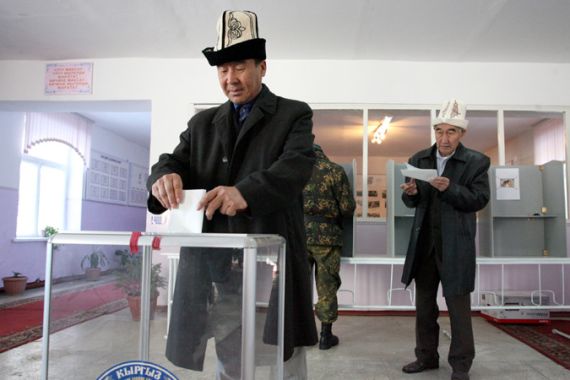Kyrgyzstan flirts with democracy
More than a year after political and ethnic unrest ravaged the country, voters in the Central Asian state head to polls.

 |
| Prime Minister Almazbek Atambayev is expected to win a plurality of votes in Kyrgyzstan’s presidential election [EPA] |
Citizens in Kyrgyzstan are going to the polls on Sunday in the first democratic presidential election in the region since the fall of the Soviet Union.
The voting follows ethnic clashes that rocked the country last year, when protesters toppled President Kurmanbek Bakiyev. The violence left hundreds dead and forced thousands more to flee their homes.
At one polling station in the Kyrgyz capital of Bishkek, Al Jazeera’s Robin Forestier-Walker watched crowds of university students “packed in like sardines” push their way into the building to vote.
In all, 16 candidates are jockeying for power, with three frontrunners vying to lead the impoverished country.
Current Prime Minister Almazbek Atambayev, a wealthy businessman, is the favourite to win.
Trailing behind are two nationalist candidates from Kyrgyzstan’s south, Kamchybek Tashiyev and Adakhan Madumarov.
‘Mount Putin’
Openly backed by Russia, Atambayev sponsored a bill in January that would name a mountain in Kyrgyzstan after Russian Prime Minister Vladimir Putin.
Bektour Iskender, the editor-in-chief of Kloop.kg, a website for Kyrgyz journalists, said that Russia and its politicians are very popular in Kyrgyzstan and the Kremlin’s endorsement of Atambayev has helped him garner support among Kyrgyz voters.
Instability in Kyrgyzstan worries Russia and the US who operate military air bases in the country.
Other voters, such as Kyrgyzstan’s minority Uzbek population, back Atambayev because they fear many of the other presidential candidates are overly nationalistic.
“Here in Kyrgyzstan, he [Atambayev] is called ‘another Putin’,” said Bakhriniso Rakhmanova, 58, who lives close to Osh, the main city in Kyrgyzstan’s south, told the AP news agency. “Uzbeks would have a breather, and a new lease of life, under him.”
However, in the village of Gulbakhor, where 3,000 ethnic Kyrgyz live in the snowcapped mountains around Osh, residents voted overwhelmingly for Madumarov, a three-time national billiards champion and former deputy prime minister.
“He’s young and honest, and his pockets are empty. He does not pursue selfish goals,” pensioner Kamchy Aliyev, 82, told AP.
North and south
While citizens’ hopes are pinned on a clean election that would signal a new democratic era, critics say people are afraid that elections perceived to have been rigged may break the fragile peace between the country’s north and south.
After the April 2010 ousting of Bakiyev, an interim government led by former foreign minister Roza Otunbayeva took control. About 100 people died as Bakiyev attempted to hold onto power.
The interim government was unable to solidify control of the country, and shortly after it took power, deadly violence erupted between Kyrgyz and ethnic Uzbeks in the south.
Last year’s clashes highlighted historical tensions between the country’s geographically and culturally split regions.
“Though the country has approved a new constitution and held parliamentary elections since that horrific time, the process has exposed deep divisions between the more developed, Russified north, and rural, impoverished south,” David Trilling, the Central Asia editor of EurasiaNet, currently covering elections in Bishkek, told Al Jazeera.
After the violence subsided, the interim government passed a new constitution that declared a parliamentary republic, which watered down the powers of the president and established the parliament as the main decision-making body in Kyrgyzstan.
Some worry that if Atambayev fails to win an outright majority in the first round, a subsequent run-off election could pit a northern candidate against a southern one, possibly leading to unrest.
“If you have a candidate from the North against a candidate from the South, I expect it to get ugly,” Trilling said.
Election woes
Observers have mixed views of the election. An hour before the polls closed, six of the 16 candidates said they would reject the outcome.
Douglas Wake, an election monitor with the Office for Democratic Institutions and Human Rights, told the Reuters news agency that although the presidential race is competitive, there were issues with voter lists and the transparency of the election process.
One of the presidential candidates, Sooronbay Dyikanov, was unable to cast a ballot because his name was not included on a voter list, Iskender told Al Jazeera.
It is still unclear why so many voters are unable to find their names.
“The central election committee says this is a mistake, and regional election commissions are the ones who are responsible for this,” Iskender said. “At the same time he [Dyikanov] says that this is done deliberately.”
Forestier-Walker’s suspicion piqued when he saw about 200 students trying to cram into a Bishkek polling station.
“I can’t understand why a bunch of students on a Sunday would show up all at once desperately trying to get in,” he said.
“I asked why they are all here at the same time and they said, ‘Oh, we just came because we were encouraged to vote for our country’.”
Forestier-Walker speculates that some Kyrgyz voters were corralled to the polls under the threat of losing student benefits.
“It’s highly suspicious,” he said. “What they normally do is put people under pressure to vote.”
Despite these irregularities, the election is nevertheless important to many Kyrgyz.
“Last year we really had really good parliament elections which were really fair, which showed the people that their vote really means something,” said Iskender. “Maybe people started treating elections more seriously after that.”